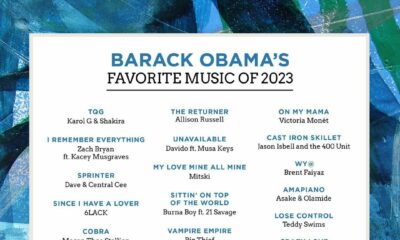News
Ken Wiwa, Chimamanda, Obama & Folake Coker share their thoughts on the “African Century” in the Globe & Mail/ONE Special Issue
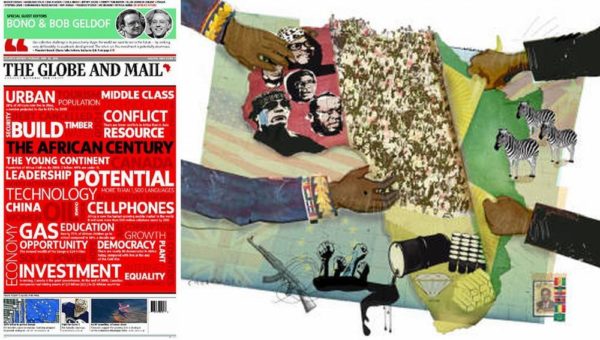
Canada’s leading newspaper – The Globe & Mail and ONE, the non-profit campaign and advocacy organization committed to the fight against extreme poverty and preventable disease, particularly in Africa collaborated for a special issue of the newspaper published on Monday, 10th May 2010. The issue was co-edited by Bono & Bob Geldof and turns the paper’s focus to Africa just as Canada prepares to host world leaders at the upcoming G8 and G20 summits.
There are op-eds and news stories by and about a wide range of Africans from Liberian President Ellen Johnson Sirleaf to Somali rapper K’naan. President Barack Obama responds to questions from Bono about US strategy in Africa. Online, it was also all about Africa as celebrated Kenyan blogger Ory Okolloh to guest edited the globeandmail.com.
It was really interesting to read through the various articles, interviews and op-eds.
Check out two of our favourite articles reproduced in full and excerpts from our other fave picks. Click over to the Globe & Mail site for complete coverage.
Ken Wiwa – Africa’s youth: An energy to liberate or detonate
 Like most Africans nowadays, I was not yet born during the colonial era.
Like most Africans nowadays, I was not yet born during the colonial era.
By 1968, most of Africa had been liberated from European rule and I entered the world in the middle of Nigeria’s civil war (its first and, to date, only one). Conventional wisdom then had it that once freed of colonial bondage, Africa would use its resource advantage to make a great leap forward. The 2000s would be Africa’s century.
Despite the subsequent decades of underdevelopment, some still believe that this will be Africa’s century.
We’ve been here before – we’ve had Africa’s decade (that was the 1980s, I think), rock concerts have been thrown to save the recalcitrant continent, and world leaders have resolved to Make Poverty History. Yet even as India and China surge ahead with their double-digit growth, the likes of Bono, World Bank chief Robert Zoellick and Chevron chief executive officer David J. O’Reilly insist that Africa will be the hard drive of the new world.
This year, the World Cup of soccer will be held on African soil for the first time and 17 African countries celebrate the 50th anniversaries of their independence. These festivals of nostalgia could heighten a collective anxiety among Africans my age, about being remembered as a lost generation. In many countries, the leaders and their cronies – Libya’s Moammar Gadhafi, Zimbabwe’s Robert Mugabe, Senegal’s Abdullah Wade – have been in power ever since those days of liberation.
Only last year, Gabon’s Omar Bongo died with his presidential boots on at the age of 73. He had been in charge of the central African country for 41 years. By the time my cohort has wrested power from these reluctant fathers, we may no longer be relevant.
Another generation is being mass-produced, surfing on a wave of technological advance, presenting a demographic time bomb that threatens to detonate everything that has gone before them. But where, I wonder, are the younger, vibrant leaders who can harness the energy of Africa’s increasingly youthful, urban and restless societies?
It was not always like this. If I rewind the Pathé Newsreels of African history, I see young Turks such as, yes, Moammar Gadhafi and Robert Mugabe, not to mention the likes of Patrice Lumumba (Congo), Kwame Nkrumah (Ghana), Jomo Kenyatta (Kenya) and Steve Biko (South Africa). There they are, all in their 20s and 30s, daring to stand up to the old order, leading their countries out of the bondage of colonialism, rejecting their parents’ institutionalized passivism and mobilizing moral outrage to separate from a Europe exhausted by the Second World War.
In memoirs such as Wole Soyinka’s colourful Ibadan, there’s a sense of a gilded age: The future Nobel laureate returns sheepishly from postgraduate studies in England, only to land on his feet as the creative director of Nigeria’s independence celebrations. My parents’ generation had it all to live for – access to good education at home (often created by colonial governments) or abroad, then almost invariably returning to take up good jobs in government or civil service. In the newly independent Africa, nations had to be built almost overnight, and young, educated men and women were pressed into exalted positions as generals and ministers, mapping out the future to fulfill their destinies. At the time, my father was a left-leaning provincial government official in his late 20s, a position that enabled him to cultivate a love of travelling as he visited places such as Cuba and Brazil as part of his education in administration.
Yet the seeds of the continent’s future dysfunctions had already been sown. The geopolitics of the postwar world meant that East and West would play chess with the map of Africa, propping up dictators such as Mobutu Sese Seko in Zaire (now Congo), Ethiopia’s Mengistu Haile Mariam or the notorious, flesh-eating Jean-Bédel Bokassa in the Central African Republic. The world waged its Cold War and turned its back on the African people.
Corruption and deficits of democracy, infrastructure and human development grew. Many African countries became dependent on a drip feed of aid and toxic loans while foreign corporations plundered Africa’s natural resources under the protection of repressive regime. The continent’s well-trained middle class voted with their feet, going abroad for professional fulfilment.
As a teenager in London in the 1980s, I remember excitedly going to my father with a copy of Guyanese academic Walter Rodney’s influential text How Europe Underdeveloped Africa. He smiled to himself, then checked my righteous fury with the tart observation that Africa had been in charge of its own destiny for some time and that Africa’s problems now were mostly of our own doing. I was deflated, especially when he took the opportunity to remind me that after my studies I needed to return home to help rebuild that failing Africa. At the time, Africa was being “structurally adjusted” by the International Monetary Fund, forced into stringent public-sector cuts in return for debt relief, a medicine some brutal military dictators took pride in force-feeding to their subjects. I was one of the lucky ones to have got out, and I couldn’t picture ever going back.
But Africa is a challenge every one of us, whether at home or in the diaspora, has to face in some shape or form. With time, my father became frustrated by the inability of Nigeria’s leaders to articulate the dreams of its people and he mobilized the Ogoni in Nigeria’s oil rich Niger Delta to protest against Shell Oil’s environmental crimes in the region during the 1990s. For that, he was arrested on trumped-up murder charges by Nigeria’s most repressive military dictator, General Sani Abacha. My father was hanged while the world crossed its arms and watched.
My own return came courtesy of an invitation of Nigeria’s then-president Olusegun Obasanjo. He was like many of his generation who had struggled to save or liberate their countries and then believed that only they had the experience and knowledge to steer the ship of state. As his Special Assistant on Peace, Reconciliation and Conflict Resolution, one of my first unofficial tasks was to try to reconcile the combative president and his equally combustible son. Along the way, Mr. Obasanjo confided in me that it was time “we prepared your generation for leadership.” At this point, he had been at the centre of Nigeria’s affairs for only 40 years.
I have spent the past four years receiving a robust education in the front lines of African government, and while my ideological framework has mellowed with age and experience, I am sometimes dismayed at the size of the task ahead of us.
Supporters of President Omar Hassan al-Bashir celebrate in Khartoum April 26, 2010. Bashir has won Sudan’s first open elections in 24 years in a result that confirms in office the only sitting head of state wanted by the International Criminal Court for war crimes. Bashir won 68 percent of the presidential vote, while Salva Kiir retained his job as the president of Sudan’s semi- autonomous south, with 92.99 percent of the vote in that race, Sudan’s National Elections Commission announced.
Africa’s natural and human resources confirm its enduring importance to the world. Sixty per cent of the world’s natural resources reside in Africa. Water, wildlife, natural gas, petroleum, gold, land, uranium, wood, steel, coal – almost every mineral or natural resource is found in abundant quantities. But the real story is hidden in the demographics.
Average life expectancy in Africa is 46 and falling, and that is an enduring shame. But those figures do not tell the whole story. While most of Europe and North America have aging “inverse pyramid” population structures, many African countries exhibit a pyramid population structure: There are hundreds of millions of Africans under the age of 30. In the Republic of Niger, 70 per cent of its 13 million people are under 25 years old. The pattern is most evident in places such as Botswana where HIV has created a country of AIDS orphans, but even North Africa is experiencing the youth bulge, with 65 per cent of its population under 30.
The bald fact is that Africa is underpopulated. About a billion people live on a continent that could easily accommodate the land masses of continental America, China, India and Europe with room to spare. Yet Africans are still eager to get out, to go to Europe, North America or, increasingly, Asia. We are no longer shocked to hear stories of desperate African teenagers frozen to death in the landing gear of aircraft in their desperation to emigrate. After all, opportunities here are often limited to a life of petty crime or migrant labour. A young person can be a recruit to a child army or to any number of crime syndicates that operate drug traffic, diamond cartels, Internet fraud, small-arms trading, oil bunkering or prostitution rackets.
From that vantage point, the dreams of our forefathers or today’s hopes for an African century seem a long way off. But there are optimistic signs.
Until the turn of the new century, Africa was still mostly a communications backwater. In-country phone calls were hard enough, but if I wanted to call Bujumbura, Burundi’s capital, from Freetown, the capital of Sierra Leone, the call had to be routed through an exchange in Europe. Information moved at a geriatric pace. Now, speaking to my brothers and sisters in Accra, Nairobi or Cape Town by cellphone is routine. Additionally, the Internet has opened up Africa to Africans and the world. We no longer have to rely on the BBC World Service to tell us what is happening in our own countries.
This morning, I read a Zambian proverb that advises, “The worlds of the elders do not lock all the doors; they leave the right door open.”
I don’t know which of the 70 languages or 72 ethnic groups of Zambia it comes from. And I didn’t imbibe the tribal wisdoms of my own elders from sitting under a tree in my village. Like most Africans today, I didn’t grow up in a village or a rural setting.
Most Africans now live in cities, making Lagos, Johannesburg, Cairo and Kinshasa among the largest in the world. No, the African proverbs that feed my nostalgia for the calm perspective of the past in contrast to the rush of modern life come in a daily dose from my African cellphone, courtesy of Twitter.
Social media have enabled us to bypass the limitations and biases of traditional media. Here in Nigeria, websites and blogs such as SaharaReporters.com routinely publish stories no newspaper would have printed in the past. As they are everywhere else, the old orders are struggling to contain the shifting shape of this irreverent new movement.
Local distribution networks and channels are piping locally produced music and film into fertile and impressionable minds, through cable providers such as DSTV and stations such as Channel O and Africa Magic, where African actors and musicians are showcased side by side with cultural producers from the West. The film industry here – Nollywood – is only the most celebrated example.
Yet one can get carried away by the vibrant viewpoints these next-generation griots bring to the mix.
The question I keep asking myself is how these cultural networks will engage with the old political order. Do any of my colleagues in government have the vision and conceptual tools to channel this youthful energy to the common good?
One man providing an answer is Senegalese singer Youssou N’Dour, an artist regarded as a conscience of his people. Only last week it was reported that he had fallen out with his long-time friend, 83-year-old President Abdoulaye Wade.
Senegal is one of the success stories of Africa, a cultural hub and a testament to what can be achieved with political stability – Mr. Wade is only its third president, a post he gained after 16 years in opposition. When I was last in Dakar, two years ago, I saw the profile of a modern, confident city, developing its natural gifts along the beautiful Atlantic coastline.
As Mr. Wade nears the end of his second term, however, there are disappointing rumours of nepotism and vanity projects, so much so that Mr. N’Dour has joined the opposition. The government recently denied a television license to his Futurs Médias group, a vehicle for a populist political movement, and the singer was able to assemble a million-strong petition in protest. This is the level of organization, combined with the freedoms afforded by the new technology, that could permit the young generation to make an impact on Africa’s political dysfunctions.
The continent is vast, rich in contradictions, complex yet simple. It is black and white, rich and poor, Muslim and Christian, north and south. It is a place that invites but defies stereotyping. As we like to say here, what you see is what you don’t get. Whether it can fulfill the claims of its boosters, only time can tell. What could be decisive is whether Africa’s leaders, new and old, learn to see the burgeoning young population as a challenge and opportunity, to be mobilized for nation building and economic success, rather than as a threat to self-serving elites.
Folake Folarin-Coker, Founder & Creative Director – Tiffany Amber
Africa is poised to make an indelible impact in the world of fashion. The rebirth has already begun for the past few seasons. The African influence on the major international runways has been so clear that it’s remarkable. That is just one piece of the puzzle. The impact will grow beyond influence and progress to international collaboration, business and trade.
I envision Africans and people all over the world wearing clothes that were ethically manufactured in Africa. I see African designers collaborating with international clothing chains to bring African fashion to high-end shopping districts around the world. Most importantly, I imagine jobs being created and economies developing as young Africans gain an education, build their skills and declare that they, too, want to be part of this fashion revolution.
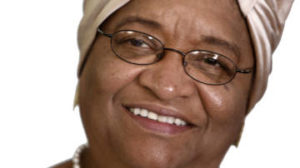 Liberia’s ‘Iron Lady’ – the continent’s first elected female president, Ellen Johnson Sirleaf – says the positive effect of good governance shows in the stark contrast between her country today and when civil war ravaged the land
Liberia’s ‘Iron Lady’ – the continent’s first elected female president, Ellen Johnson Sirleaf – says the positive effect of good governance shows in the stark contrast between her country today and when civil war ravaged the land
For more than a century, Africa’s fate was more often than not decided by people beyond its shores. Today, Africa is a continent of free nations; self-determination, stronger leadership and more accountable governance have all paved the way for economies to grow and poverty to fall. To stay on this path, African governments and, crucially, their development partners too, must continue demonstrating equal commitment to the leadership and accountability that are making a difference.
Mo Ibrahim’s Interview in the special Africa issue of the Globe & Mail
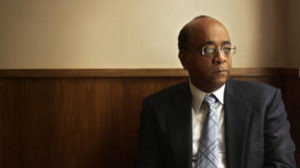 How do you convince people Africa is a place to invest?
How do you convince people Africa is a place to invest?
People are too shy about Africa. All you see is 10 seconds in any news bulletin. After they talk about Darfur and [Zimbabwe President Robert] Mugabe, time is up. People have the impression Africa is troublesome, all about dictatorships and bad rule, but what they see is the bad examples. Of 53 countries, there are at least 29 or 30 democracies, and we have a good work force.
Around Christmas, what you see on TV ads for Oxfam and Save the Children is famines, terrible conditions, and that creates an impression. They think we are all sick or weak, but actually we have very healthy people. Just watch the Olympics – we run faster, we jump higher, we are excellent footballers. We are good people and we can be a good place to invest. According to World Bank reports, the highest returns on investment in the last few years were always in Africa.
Chimamanda Ngozi Adichie – A new Nigerian-ness is infusing the nation
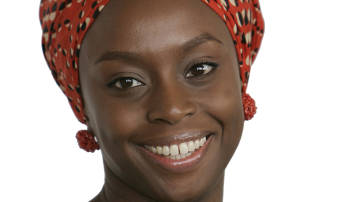 Mine is a dispersed family. My engineer brother lives in England, my doctor sister lives in the United States and I, with the peculiar good fortune of being a full-time writer, divide my time between the United States and Nigeria. We are not very different from other middle-class Nigerian families; most of the friends I grew up with in the academic town of Nsukka now live abroad.
Mine is a dispersed family. My engineer brother lives in England, my doctor sister lives in the United States and I, with the peculiar good fortune of being a full-time writer, divide my time between the United States and Nigeria. We are not very different from other middle-class Nigerian families; most of the friends I grew up with in the academic town of Nsukka now live abroad.
When these friends, and many others like them, graduated from university, they were shrouded in the lethargy of military rule. The future was a vision of impossibilities. They could not find jobs, could not start businesses and so the only thing to aspire to was a foreign visa. They are now working abroad as doctors and security guards, home health aides and lawyers. They form vibrant Nigeria-focused groups on the Internet and regularly send money back to relatives. Some save carefully for yearly visits home. Many others, like an acquaintance I will call Emeka, have not been back in years. Emeka finally visited Nigeria last Christmas – the first time since 1996 – and what he found most striking was this: The nightclubs in Lagos played Nigerian pop music.
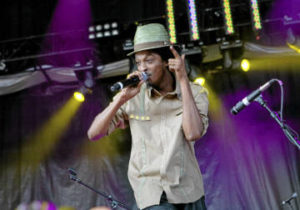 K’Naan – Between the highs and the lows, life happens
K’Naan – Between the highs and the lows, life happens
It was not my dream to be an artist.
How could it have been? I thought artist, much like a leader, was something you either were or weren’t. Never something you set out to be. And as a boy in Mogadishu Somalia, although art plainly encapsulated the world as I knew it, what I really wanted to be was an optometrist.
But there weren’t any doctors in my family. My father, they explained, was a civil servant of sorts, who then moved to New York for reasons all the poets in my life would fail to articulate. My mother was, by nature, a poet, but above all the distraction of talent, she was a mother. Her father was loved by all, a poet whose nickname was Ahyaa Wadani, meaning something like “The Passion of the Country” or, “the Soul of the Country” or, “The jewel…” (Translating the Somali language into English is like squeezing an oversized person into a fitted shirt – always needs some stretching to make it work.)
Bono interviews Obama for the African Century edition
During the Africa Century guest edit on Saturday, Bono said he was meeting U.S. President Barack Obama at the White 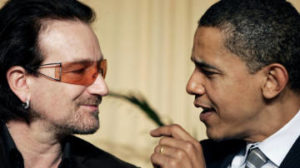 House recently, and had his upcoming stint at The Globe in mind. “Obama was walking out the door of the Oval Office and I said ‘by the way…’ Poor guy,” Bono said. The meeting prompted the following exchange.
House recently, and had his upcoming stint at The Globe in mind. “Obama was walking out the door of the Oval Office and I said ‘by the way…’ Poor guy,” Bono said. The meeting prompted the following exchange.
What’s your most vivid memory from your last trip to Africa?
Stepping off the plane in Accra and being met not just by the sitting President, John Atta Mills, but also by the political opponent he very narrowly defeated in Ghana’s last hard-fought but peaceful and fair election. Their presence there together was such a powerful symbol of Ghana’s pride in its own democracy. Governments that are accountable to their citizens, and that accept the important role of peaceful opposition parties, are essential ingredients of any solid and sustainable development plan, and to any effort to build lasting peace and stability.
Click titles to read the full articles and Visit the Globe & Mail Africa Century Mini Site
Photo & Info Sources: Globe & Mail | ONE
All rights reserved by the aforementioned parties






